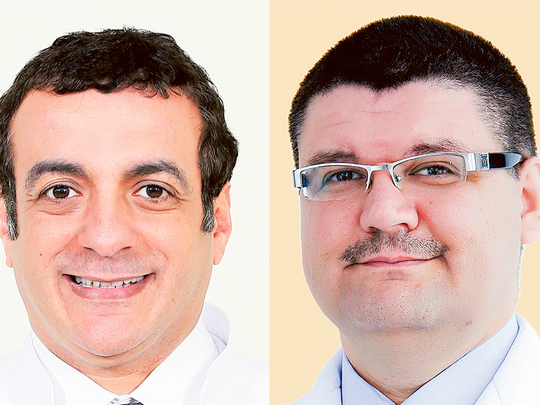
Dubai: Prostate cancer is the fastest growing urological cancers with others being kidney, bladder and testicular cancers, say doctors.
This remains true around the world and in the UAE as well.
A 2015 report of the Health Authority Abu Dhabi (HAAD) points out that 20 per cent of the cancers diagnosed annually among males in the UAE are prostate cancer.
In the month of November, when men mark the ‘Movember’ event, by growing and grooming a moustache with the intention of raising awareness of prostate and other male cancers, it’s time to take a good look at the symptoms, causes and prognosis of this condition.
What is prostate cancer?
Dr Amgad Farouk, head of the department and consultant urologist at Medeor 24/7 Dubai, explained: ‘The prostate is a small walnut-sized gland in the male reproductive system placed just below the bladder. It can develop a tumour that can be cancerous. In the US and West, prostate cancer is quite common. In the UAE, the entire Middle East and Far East, its incidence is comparatively lower. However, men need to be aware of it as changing lifestyle has spiked its occurrence here.”
Dr Esmail Khalid, specialist urologist at Prime Hospital, Dubai, added: “Although the incidence is lower, we can still say that among the urological cancers such as of the kidney, testicles and bladder, prostate remains the highest occurring one in the UAE.”
The reasons
A clear genetic history of prostate cancer in the family places a male in the high risk group. In addition, obesity, lack of enough fibre in the diet and advancing age are some of the factors that can trigger tumours in the prostate. Dr Khalid added: “The good news is that prostate cancer is reversible if detected early. So it is important for men to get a Prostate Specific Antigen (PSA) screening done annually once they cross 40 years. For those with a family history of the cancer, it is advisable to go in for screening from the age of 35.”
Dr Farouk added: “The PSA is a protein produced by this gland and, if high, can be an early marker for cancer. However, not every high PSA result must be interpreted as positive for cancer.”
He attributed high PSA levels to prostate infection, or to friction on the gland due to doing things like driving a motorcycle. “When a patient comes to us with a high PSA result, we first put him on antibiotics for two weeks. If the results are still high, we try another course of antibiotic.” After that, doctors opt for oral examination such as a transrectal ultrasound which is effective in checking such cancers. This can be followed by a transrectal biopsy while conducting the ultrasound scanning.
Symptoms
It is difficult for a person to actually know if he has prostate cancer as the individual remains largely asymptomatic in the early stages, said Dr Khalid.
But both Dr Khalid and Dr Farouk think it is important for young males to be proactive, adopt an active lifestyle, keep obesity at bay and include lots of fresh fruits, vegetables and non-processed, high-fibre foods in their diet. “Men must optimise their Vitamin D levels as high vitamin D is associated with low incidence of prostate cancer. Also inclusion of tomatoes and soy in the diet can help cut prostate cancer chances to a large extent,” said Dr Khalid.
Signs to look out for
A burning sensation while passing urine
Emptying bladder completely seems difficult
Frequent urge to urinate especially in the night
Having trouble starting or stopping urination
Blood in the urine
Back pain in case the cancer has metastasised to other organs
Loss of bladder control
Treatment
For those who are diagnosed at a younger age, the most usual steps taken by urological oncologist surgeons are:
1. Radical prostatectomy, followed by chemotherapy to destroy traces of all cancer cells. In case it has spread to the bones, radio frequency ablation or RFA is done.
2. Hormone therapy is used in the early stages to neutralise the prostate gland. Dr Khalid added: “If the cancer has metastasised, we usually try and do a hormone therapy. If a person develops prostate cancer beyond the age of 75, we usually put the individual on active surveillance.”
3. Cryo-therapy, which involves freezing of the cancer cells, is also very effective.












